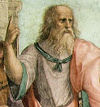- Clitophon (dialogue)
-

Part of the series on:
The Dialogues of PlatoEarly dialogues: Apology – Charmides – Crito Euthyphro – First Alcibiades Hippias Major – Hippias Minor Ion – Laches – Lysis Transitional & middle dialogues: Cratylus – Euthydemus – Gorgias Menexenus – Meno – Phaedo Protagoras – Symposium Later middle dialogues: Republic – Phaedrus Parmenides – Theaetetus Late dialogues: Clitophon – Timaeus – Critias Sophist – Statesman Philebus – Laws Of doubtful authenticity: Axiochus – Demodocus Epinomis – Epistles – Eryxias Halcyon – Hipparchus – Minos On Justice – On Virtue Rival Lovers – Second Alcibiades Sisyphus – Theages The Clitophon (also Cleitophon) is a dialogue generally ascribed to Plato, though there is some disagreement regarding its authenticity. It is the shortest of the dialogues, and is significant for focusing on Socrates' role as an exhorter of other people to engage in philosophic inquiry.
The dialogue features two participants, Clitophon and Socrates, and the central feature of the discussion is Clitophon's lengthy complaint about Socrates. The crux of this complaint is that, while no one excels Socrates in protreptic or exhortation to the virtues and the life of philosophy, no one is more useless to one already persuaded of their importance. Socrates does not respond, or the dialogue does not contain his response.
Reception
Some scholars doubt the authenticity of the Clitophon because (as we have it today) Socrates does not emerge victorious in the verbal battle. One school of thought in favor of its authenticity thinks that Plato wrote it, but then decided to have the argument in the Republic. This interpretation holds that the dialogue is the rare piece of esoterica or not meant for publication. The dialogue has also been interpreted as a finished piece of the Platonic corpus, intended to be read in the version which we currently possess.
In fact the ancient tradition never questioned the dialogue's authenticity, and it is referred to as Plato's work by Olympiodorus, Apuleius, Hippolytus and Alcinous. Suspicion about the Clitophon seems to have arisen in the Renaissance, when Marsilio Ficino wrote "hic liber non est Platonis" at the head of his translation of the dialogue. The Clitophon was published (mistakenly) among the Platonic spuria in the Aldine editions of Plato, a mistake that was retracted and apologized for by the editors, but never corrected.
Much recent scholarship has regarded the dialogue as authentic, including articles by Mark Kremer, David Roochnik, Clifford Orwin and Jan Blits. The most comprehensive study of the of Clitophon, that of S.R. Slings, (Plato: Clitophon, (Cambridge, 1999)) claims that the Clitophon is authentic; Slings changed his mind regarding the dialogue's authenticity twenty years after his Doctoral dissertation spoke against its authenticity. The most recent study of the Clitophon, (G.S. Bowe, "In Defense of Clitophon," Classical Philology 102:3, 2007 pp. 245-264) also argues for the Clitophon's authenticity and contains a review of the relevant literature, as well as remarks on its significance for Plato's Republic.
Categories:- Dialogues of Plato
Wikimedia Foundation. 2010.
